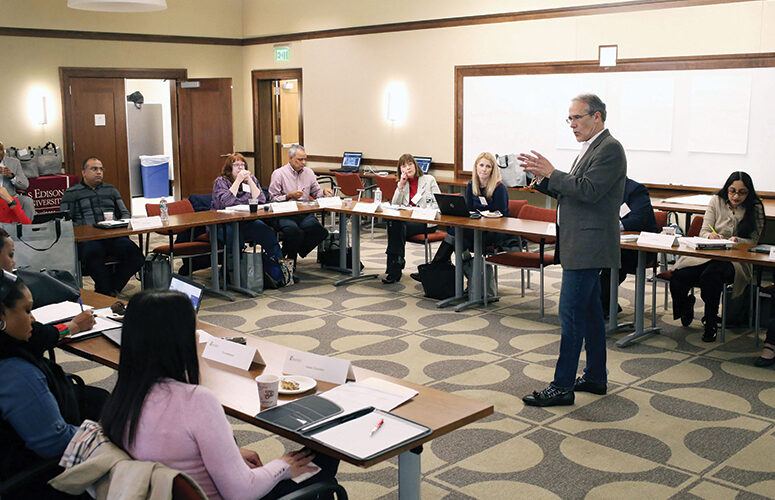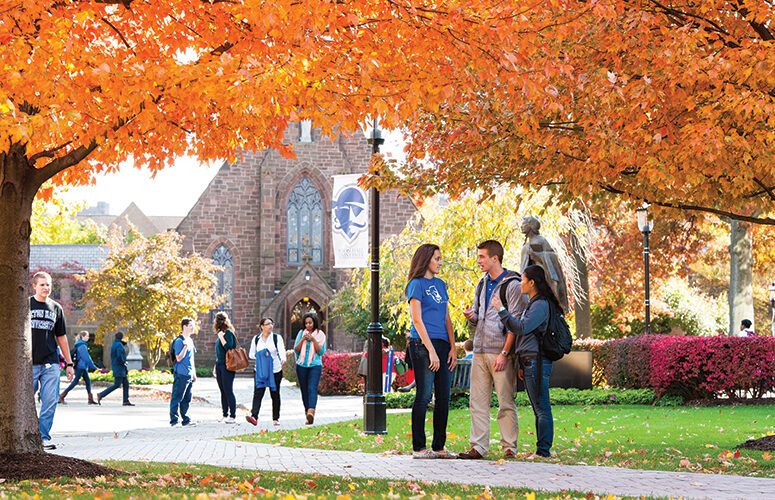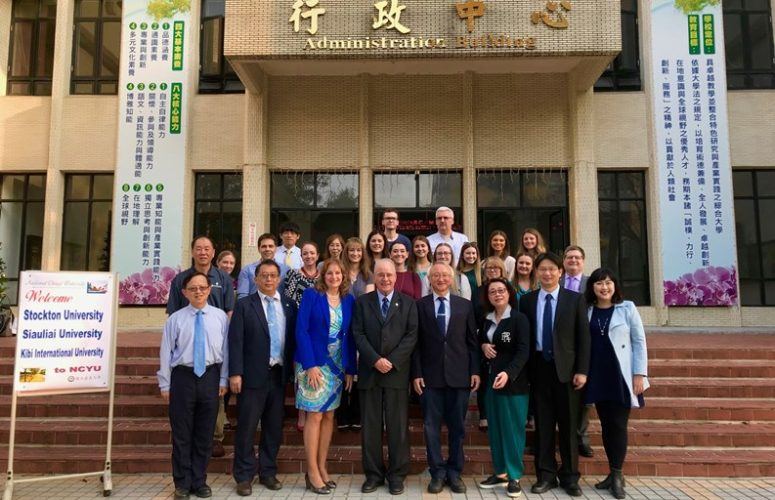
MBAs and Grad Degrees Evolve for the Post-Pandemic Workforce
Universities across the state adapted their graduate programs to meet the need for remote learning and new career demands in the wake of COVID-19.
By João-Pierre S. Ruth, Contributing Writer On Apr 5, 2021Establishing virtual and hybrid options to continue to teach MBA and other graduate students during the pandemic was just the start of an evolution underway at universities across the state.
New graduate-level students and those already in the workforce turned to institutions such as Montclair State University, Stevens Institute of Technology, Thomas Edison State University, William Paterson University, and Stockton University to elevate their professional skills to compete in the current and post-pandemic market. This led the institutions to develop new approaches in teaching curriculum and update graduate programs to better fit the next new normal the economy may face.
All institutions had to pivot quickly to adjust processes, recruitment strategies, and enrollment forecasts to adapt to the new reality, says Bryan Moschel, director of admissions and operations of the Graduate School at Montclair State University. Up until the middle of last March, he says, his school’s fall 2020 graduate enrollment was positive – roughly 3.5% above the prior year’s submitted application totals. “Pre-pandemic, the signs were positive that we were poised to do well,” Moschel says.
Though COVID-19 introduced a host of unexpected variables, he says Montclair’s graduate school had its best year in 2020 in its history for enrollment. “We saw our year-over-year enrollment increase by almost 12%,” Moschel says. “Submitted applications after May 1 increased by more than 21% compared to the prior year. Our summer was enormous.”
It is not uncommon for graduate enrollment to increase in times of economic and financial uncertainty, he says. “That happened in the late 2000s, so we anticipated more of that this time around. We just didn’t realize the sheer amount of interest we would receive.” The interest this time came from unexpected career changers, Moschel says, as well as people who wanted to upskill within their current professions and boost their market value.
The focus of graduate curriculum was due for a bit of an update and the pandemic accelerated such changes. Up until about a generation ago, little had evolved with MBA programs, says Gregory Prastacos, dean of the School of Business at Stevens Institute of Technology. “It has always been about the language of business, like strategy, marketing, finance, operations or leadership,” he says. “For a very long time, there was no change at all.” In the last 10 to 15 years, with significant acceleration from the pandemic and technology, such disciplines underwent dramatic transformations, Prastacos says. He cites the evolution of the market to a more digital and virtual nature, where companies such as Facebook do not own content, but make it available on their platform; and also Uber, which does not own any vehicles and yet became a substantial force in transportation.
The digital direction of the market meant changing the curriculum being taught in graduate programs, Prastacos says. “It is very clear that the skills around digital technology and numerical skills are gaining a lot of importance,” he says. “Anybody working in strategy, marketing or finance needs to have an understanding of the new tools and how they are used to create value by assessing data and make decisions.”
There may be even more adjustments to come for MBAs and graduate degree programs.
“We’re in a period of absolute radical change unforeseen before,” says Michael Williams, dean of the School of Business and Management at Thomas Edison State University. He says it is difficult to prognosticate about what the landscape will look like after the pandemic. Education and ways of working naturally have changed, for instance. Remote access to classrooms and jobs is suddenly a new norm and priority rather than a special option or employee perk. “That shift in the way we work is so radical,” Williams says. “[Remote] working and distance education are now suddenly on the same side.”
He says COVID-19 changed the dialogue permanently regarding where staff work even after offices and other business operations fully reopen. This likewise affects MBA and grad programs, Williams says, as entire curriculums will continue to be available remotely. “MBAs, DBAs, BSBAs, all the various business degrees are going to have to be viable to deliver online,” he says.
MBA programs remain the workhorse among graduate degrees, but this is being amended, Williams says, as other specialized disciplines gain importance in the workforce. “The MBA is a generalist degree,” he says. “You’ll learn a lot about a few things.” Meanwhile, in the post-pandemic world, master of science in healthcare and healthcare management degrees will be critically important, Williams says. “Master of science in data analytics is also coming to the fore with a growing reliance on and demand for technology and cybersecurity,” he says.
The necessity for interdisciplinary education has increased to make graduate degrees more robust and more relevant, William continues. For example, finance can affect leadership in nursing or public policy development.
Graduate students now have a clearer perspective on what their goals are for post-pandemic careers and the courses they need, says Anthony Bowrin, dean of the Cotsakos College of Business at William Paterson University. He says his institution’s MBA program was well-prepared to offer remote learning because fully online education from the university was already in the works to launch. “Just as we were about to do that, the COVID-19 pandemic started,” he says. The timing of the online curriculum seems to have been a windfall for the university. Enrollment in the MBA program at William Paterson more than doubled in the last year, Bowrin says. “We were quite lucky we were headed in that direction.”
William Paterson has seen increased demand for fully online and specialized degree programs instead of general MBAs, he says. “We’ve had requests for business analytics, professional sales, financial services, and a number of other areas.” Financial services and human resources management are the fastest growing areas of specialization at the university, he says, and there are plans to further expand such offerings next fall to accommodate the pace of change. “Most of our students, more than 70%, elect to do one of the specializations, when before it was probably 50-50,” Bowrin says.
With more curriculum available online, he says recruitment of out-of-state students may continue to grow, including among international students, though some students might still prefer in-person classes when they become more feasible after the pandemic.
Some of the long-term changes to the market might be met by collaborative approaches to future graduate programs. Tara Williams, associate director of graduate programs, Stockton University, says her institution offers 18 different graduate programs with a general MBA program as well as a newer program; an MBA in healthcare administration and leadership, which debuted in fall 2020.
“That started as a partnership between Stockton University and AtlantiCare Regional Medical Center,” she says. The program evolved, Tara Williams says, to train local hospitalists, pharmaceutical reps, or anyone in the medical field who wants to learn the business side of things with an MBA.
Many healthcare workers took interest in the program, Tara Williams says, with a belief that when they finished it would help them be very marketable. “The overall theme we’ve seen in graduate admissions is although most folks may shy away from beginning a graduate school program during an economic downturn, we’ve been sharing with them that we think this is a good time,” she says.
Other graduate degree programs that she says have seen a boost of late include social justice programs and social behavioral sciences. “These are programs that help professionals become leaders in policy planning, social justice, and humanitarian work. We have a master of arts in Holocaust and genocide studies, a master in social work, and a master in counseling, [for example],” she says.
Grad schools continue to be a way for students to build up networks of contacts, Tara Williams says, which could prove useful when interviewing for jobs or pursuing promotions once the economy recovers. We are still months away from significant reopening efforts to begin, but Stockton already has limited in-person classes for the MBA in healthcare administration held at AtlantiCare along with virtual sessions, she says. “We hope fall 2021 will be somewhat back to normal.”
To access more business news, visit NJB News Now.
Related Articles:





